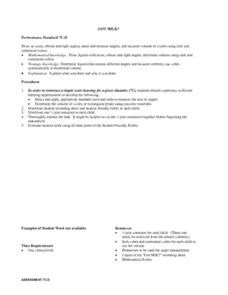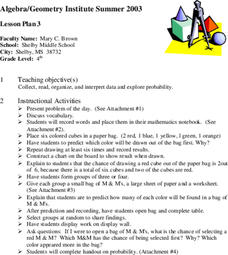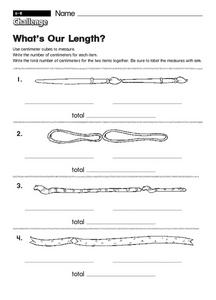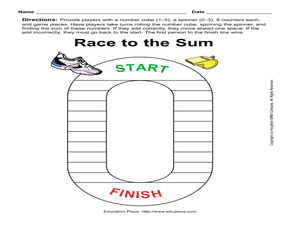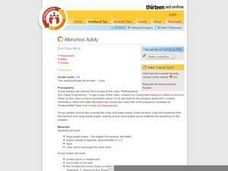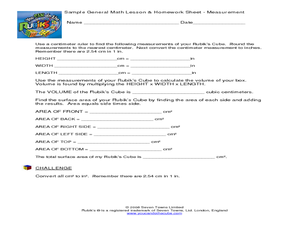Curated OER
Represent Numbers, Joining, More/Less
Have your learners practice their simple addition and recognizing larger and smaller quantities with this fun and simple exercise. Counting apples is an entertaining way for them to show off their skills!
Curated OER
Identify, Sort, Classify
Students improve their identifying, sorting, and classifying skills. In this categorizing instructional activity, students use cubes to practice their sorting, classifying, and identification skills.
Curated OER
Got Milk?
Students measure the angles of a milk carton. They identify and label acute, right, and obtuse angles. Using appropriate tools, students determine the volume of a cube or a rectangular prism. Students complete worksheets to...
Curated OER
"Panic Button 3" Explore in Base 4
Fourth graders learn a bout Base 4 by using 3 unit cubes, 3 four rods, 3 four squares and 1 four cubes.
Curated OER
Exploring Probability
Fourth graders participate in a lesson that explores probability. They use candy and model cubes to experiment with different outcomes that can be charted if the students can proceed to the objective of the lesson. They discover how...
Curated OER
What's Our Length
For this measuring length worksheet, students use centimeter cubes to measure the length for each illustrated picture. Students write the number of centimeters for each picture and add the centimeters for both items. Students write the...
Curated OER
Race to the Sum: Addition Game
In this addition worksheet, students play an addition game using a number cube, spinner, 8 counters and game pieces. Students add the sum of a rolled number and spinner number to move forward.
Curated OER
Don't Box Me In
Students explore the relationship between flat and three-dimensional shapes. They identify the names of 3-D shapes and construct cubes from squares.
Curated OER
Construct Figures to Find Specific Volume
Sixth graders use number cubes to explore volume of two-dimensional shapes. They roll a die and construct a shape using the numbers rolled as measurements of the sides. They estimate the volume of a given object, and then use the...
Curated OER
Identify shape of window
In this shapes worksheet, students identify the shape of the window in the picture. Students choose between a square, circle, or cube.
Curated OER
Probability Concepts (Practice 20.2)
In this probability worksheet, students solve 16 problems pertaining to probability and likely, less likely, certain and impossible outcomes.
Curated OER
Find Volume
In this finding volume practice worksheet, students sharpen their problem solving skills as they solve 6 problems that require them to find volume.
Curated OER
Measurement
Students measure angles, perimeter, area and volume. In this geometry instructional activity, students define different ways to measure and solve for the perimeter, area and volume of geometric shapes. They analyze and process...
Curated OER
Measurement Concepts
In this measurement worksheet, students solve 7 word problems and 1 multiple choice test-prep question. Students use non-standard classroom items to estimate and measure objects in order to solve the problems.
Curated OER
Measure
Students are asked what activities or things that they do each day. They are then asked do you do that in the morning, afternoon, or night? Students are then asked which of those things do you do first, second, third, and etc.
Curated OER
Riddles Everywhere
In this addition worksheet, students solve 5 word problems which are in riddle form. Then students use their answers to solve another riddle at the bottom of the page.
Curated OER
1st Geometry
In this geometry worksheet, students choose the multiple choice answer to 15 questions involving several different elements of geometry.
Curated OER
Building Buildings
Seventh graders investigate 2-D and 3-D objects. In this geometry lesson, 7th graders begin to understand spatial reasoning. Students look at pictures of the NYC Skyline and discuss what it looks like from different views. Students use...
Curated OER
Graphing Data
Students graph lines in a coordinate plane. In this geometry lesson, students graph lines on a coordinate plane, and identify the slope. They calculate the volume, area and perimeters of the shapes created on a coordinate plane.
Curated OER
Cross-number Puzzle 1
In this secondary mathematics worksheet, students solve a cross number puzzle. The one page worksheet contains one problem with the solution.
Curated OER
Power Laws
In this power laws worksheet, students solve and complete 6 different types of problems. First, they express each using powers and write in index form with a given base. Then, students calculate each problem and write in simplest terms.
Curated OER
Stuffed Animals Measuring
Learners measure stuffed animals with various materials such as dog biscuits, paper clips, and yarn. In this measurement lesson plan, students measure the stuffed animals, and understand the concept of long and short and big and little.
Curated OER
WINDMILL POWER
Students study operations with real numbers using mental computation or paper-and-pencil calculations. They judge the reasonableness of numerical computations and their results. They set up and solve proportions for direct and inverse...
Curated OER
Division 1-5
Six pages of various division problems are included in this packet. Questions include short answer, multiple choice, word problem, and filling in tables. Your class will get adequate division practice after completing these 30+ problems.




